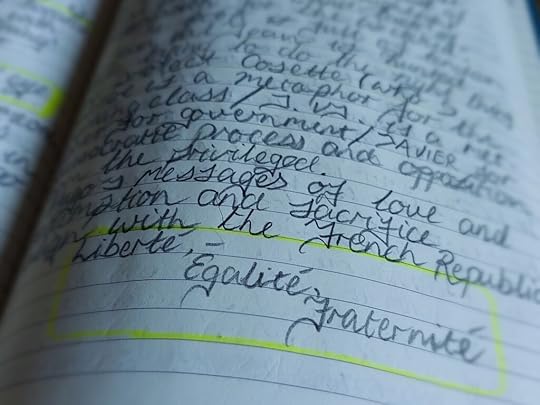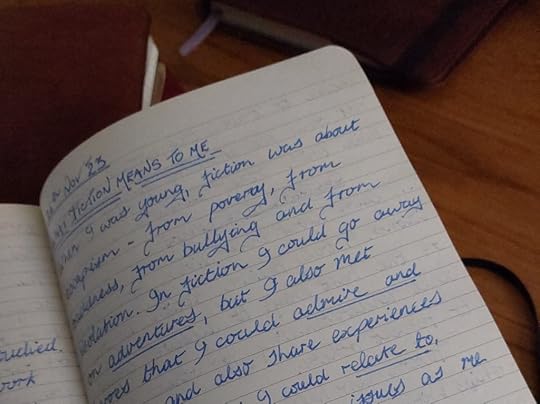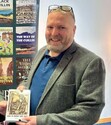Iain Mac Lachlainn's Blog: Iain Mac's Writing Journal, page 2
July 2, 2025
Les Misérables
I only got round to reading this last year, at the age of fifty-two. Part of me wishes I had read it earlier, but then, on the other hand, there are many books that I wish I could read again for the first time so I’m glad I saved this one till later.
This is an analysis rather than a review, so I will be discussing plot.

This book opens gently with parable-like descriptions of the life of Monsignor Myriel, which are soothing and cathartic. As you heft the fifteen hund...
June 25, 2025
The Overstory
This is an engaging and frightening novel about forests and the price that some people are willing to pay to bring attention to the catastrophe that is unfolding on our planet.
The novel is structured in such a way that we are introduced to (the ‘Roots’ of) a handful of diverse characters and their varying relationships with trees, and how they come together (in the ‘Trunk’) to try to make a difference, through activism, academic and political means to directly protect or...
June 19, 2025
Burials and Other Stories
I enjoyed these stories immensely, which pay tribute to the traditions and language of Scottish storytelling while spanning a remarkable range of structure and technique. An award-winning crime writer that has attracted praise from Val McDermid, Rob McInroy steps only occasionally into that genre while delivering this collection which includes folklore, historical fiction, black comedy and contemporary literature.
These twenty tales are written both in short, sharp flash-fiction, and in longer pieces in poetic prose and in more brutal dialogue.
The range of the dialogue demonstrates the distinctions of Scots language as the stories travel through space and time from nineteenth century crofts to the streets of twentieth century Leith and the haunts of small-town Perthshire in the present day. I found these renderings of language and character as powerful as more well-known champions of Scots, such as Irvine Welsh and James Kelman, but there is also that beautiful and subtle drollness of the more authentic rural voices to be found in Robin Jenkins’ ‘Pearl Fishers’ and Stanley Robertson’s ‘Reek Roon a Camp Fire’.
The characters delivering the dialogue are just as varied, either beckoning the reader to listen more closely and on occasion, challenging readers perception of reality with all the beautiful (and repulsive) imagery reminiscent of Alisdair Gray – (there’s one such recurring misfit that you’ll love when you meet her). The situations we find the characters in are tense, emotional, awkward, frightening and sometimes darkly funny, but they always reveal the fragility and flaws of the inner workings of humans yearning to be loved and accepted.
McInroy’s crime-writing credentials are evident as he occasionally leads the reader down the wrong path, or misleads with sleight of hand, and it’s easy to see why his prize-winning extends to other genres as he skilfully draws this collection together by language and place so that this is more of an anthology than a collection.
The author’s notes inform us that some of these stories are based on characters from his novels, so I will definitely be adding those to my reading list.
June 12, 2025
James
No spoilers unless you haven’t read Tom Sawyer and Huck Finn. If you haven’t, I would recommend you do, but it’s not necessary.
Straight up front, be warned: this book is not ‘ferociously funny’ as described in the blurb. There is a nod to Twain’s satire, there is gallows humour, cynical wit and irony, but nowhere is it funny. The book deals with the horrors of slavery and the worst cruelty and greed of human beings, all set against the fear of impending recapture or of being sucked into the muddy waters of the Mississippi.
When I heard this book was due for publication it was like receiving a letter from a friend that I’d not heard from for nearly forty years. Which is how long it has been since I read Tom Sawyer and Huck Finn back-to-back as a boy. Most of my memories of those books are dim, but some still stand out. Tom getting the fence painted, Injun Joe, etc. But the character that I never forgot and always missed was Jim. Back then, I was in awe of his courage – the courage to run away and the strength to go on. Although I couldn’t articulate it then, I didn’t realise that Jim would contribute to the person I would become, and that I would never forget him.
And now, after all these years I was going to find out what happened to Jim. Except, this is a retelling, rather than a sequel.
Instead, this is Jim’s Odyssey. The many-headed monsters are more terrifying, the muddy sea is more treacherous and the hospitality of strangers is in short supply. And the goal is greater: To be reunited with his family, yes, but also to have the freedom to become James. Although told in a different way from Twain, I am still in awe of James’ courage.
June 11, 2025
Beginning to Write
As a child I read at the kitchen table with my fingers in my ears and held the book open with my elbows. I read Roald Dahl and Agaton Sax and The Hardy Boys. I found a friend in Charlie Bucket and Danny, The Champion of the World. I found suspense and excitement with Agaton Sax. I didn’t see words; I saw pictures and scenes. I heard the voices of the characters.
My mother had shelves full of classics that had been hers when she was a child. Amongst them were Treasure Island and Kidnapped. John Silver burst into my imagination; a flawed hero larger than life that I rooted for. David Balfour on the other hand was a young man that I could relate to more than Jim Hawkins, and Alan Breck Stewart a hero that I would have followed to the end of the earth thanks to an old-school teacher I had in primary school.

She wore her white hair in a tight bun and wore three-piece tweed skirt-suits in a variety of colours. She had been my father’s and aunts’ teacher, and she was terrifying. She wielded the strap like a shield-maiden wielding a battle-axe. She was also the earliest inspiration. She was the first to teach us of the Highland clans that were our ancestors, the first to tell us tales of battles and bravery and witch-craft in the misty glens. She would assign us the latest class project, usually related to where she had been on holiday. The project would consist of learning about the subject (Highland clans, Norway and the Vikings) which would include drawing pictures, and of course, writing stories.
Not a sound could be heard when the class was set to the task of composition, and I thrived in the silence. My hand would cramp as it shuttled across the page racing to weave the yarn spun from my imagination. An afternoon of story writing would pass in a flash, compared to the endless mornings of maths. I knew early on where my heart lay.
One of the earliest stories I remember writing was a piece about Marco Polo involved in an elephant mounted battle on The Silk Road. As a nine- or ten-year-old boy, my writing involved a lot of gratuitous violence.
As I grew, and read a lot of Scottish history, the story of the destruction of the Highland way of life and the ethnic and cultural cleansing of a people swept away any notion of romanticism, and lead to the writing of Bluebell Souls.
The root of that novel though, and of all my writing, is in that silent classroom, where a shield-maiden stood ready to fell any pupil who lifted their head from their task.
June 5, 2025
This Is What You Get
Is now available to add to your [digital] TBR pile on Goodreads. Please add it to read, or give it a rating and/or review.
Ta, Iain.
What fiction means to me

When I was young, fiction was about escapism. To be lost in a book that was exciting and filled with adventure and populated with
larger than life heroes helped me to forget about poverty and bullying. While reading fiction I was carried away on voyages; my imagination would be fired and I would be lost in another world. I met heroes that I could admire and follow and I could share the experiences of characters that I could relate to; kids like me. I wasn’t alone when I had a book in my hands.
In literature, I have come to enjoy the art and history of language. The variety of structures and styles in which fiction can be written to provide plot and character. The skill of writers that dictate the beat and tempo and to render their worlds in beauty and horror fill me with as much admiration as the characters they create.
There is nothing more human than storytelling . . . it reaches back to the very birth of humanity and it is in the stories we tell our children to warn them of danger, to teach them to be kind and to help them to think and laugh. I find the history and evolution of language fascinating and believe that keeping our dialects and vernacular alive in a world where we are losing language is more important than ever.
I love to discuss literature, books I’ve read, characters I love, hate, or have a more complex relationship with. The fact that you are here and reading this means that we at least have that in common. I think that discussing fiction improves your relationships with others, helps you to connect when you see things the same way and to understand each other when you see things differently. Talking about books increases your vocabulary and of course, your knowledge.
You accumulate an unquantifiable store of facts when you’re reading, whether it’s a classic encyclopaedic novel such as Moby Dick (where you learn everything worth knowing about whales), or a spy thriller (where you learn the fundementals of communicating in code) most of it sinks in and lodges itself somewhere in your mind, to remerge one day when you least expect.
It is my aim to write fiction which evokes empathy and increases compassion by telling stories from the viewpoint of those that are different or underrepresented, and to tell stories that include themes that I think are relevant to ordinary people, whether those stories are set in the past, the present or the future. I also try to tell stories that inform and entertain.
These things are all an aside from the physical act of reading. To sit with a book in your hands, to be at peace. To dream and escape, and to exercise your mind and soul.
I believe in the power of the novel as a means to reach out and strive towards making the world a better place, because it is reading fiction that improved my life and changed the way I see the world.
Iain Mac's Writing Journal
- Iain Mac Lachlainn's profile
- 2 followers



